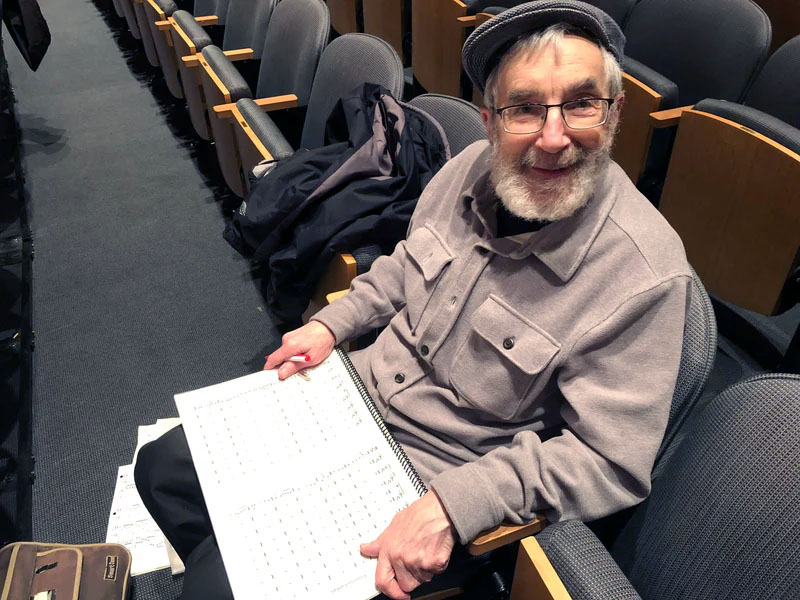
Paul Schoenfield was one of our era’s rarest and most beguiling composers, a beloved colleague and friend whose loss we are still struggling to fathom. It’s an honor for the 21st Century Consort to offer a tribute to the extraordinary music he composed for us contemporary performers and audiences:
-
A Portrait of Pinchas: Memorial Concert for Paul Schoenfield
at 2:30pm on Sunday September 152024
St. Mark’s Episcopal Church on Capitol Hill
free concert, no tickets required- Carolina Reveille
- Three Bagatelles
- The Return from Sextet
- Elegy, Rag and Boogie
- Tango and Tin Pan Alley
- Trio for Clarinet, Violin and Piano
With flutist Sarah Frisof, clarinetist Paul Cigan, percussionist Don John, pianists Lisa Emenheiser and Ellen Hwangbo, violinist Aaron Berofsky, violet Daniel Foster, cellist Rachel Young and conductor Christopher Kendall. Note that location, day and time for this concert are a departure from Consort tradition, and there will be a pre-concert discussion starting at 1:30pm.
An unrepentant iconoclast who good-humoredly thumbed his nose at contemporary music orthodoxy, Paul wrote irresistible music that nevertheless challenges his performers to the max (especially the piano; he was always hardest on himself) in the way virtuoso performers love being challenged.
Paul as a person was also an iconoclast, utterly one-of-a-kind. It was possible to imagine that Paul’s affability was cultivated to provide plausible deniability for a subversive sense of humor. Over dinner at our home, he would hurriedly mutter his Hebrew blessing, then with some Kosher fare and a bit of lubrication, become increasingly fluent and funny. Some of his humor was an odd mix of the coarse and arcane, hard to fathom even with the benefit of the invaluable “Born to Kvetch” (Michael Wex) that he kindly provided for our acculturation. A shining example of his exuberant wit that too few will experience is the composer’s amazing gospel oratorio “D’vorah,” a major work by any measure. These days it might be considered a little TOO iconoclastic or….appropriative – a terrible shame, as it is clearly steeped in deep appreciation for the styles it appropriates, reverently and brilliantly.
For expressive range, consider the wild ride of so many Schoenfield pieces (the Clarinet Trio on today’s program, for example), in which the fun tips into a kind of existential peril. And the works that are not fun at all, but darkly Schoenbergian (and autobiographical), like the “Four Parables” or “Sextet” (which was written for the Consort and we hope to release in recorded form soon). These occupy a remote antithesis to unbuttoned, irresistible – though exquisitely crafted – romps like the “Three Country Fiddle Tunes” or “Vaudeville” (of which I conducted the premiere with the Seattle Symphony…the concert where my wife Susan and I met!). And between falls the heart-breakingly beautiful music like the middle movement of “Café Music” or the “Six British Folk Songs.”
Paul harbored an impressive menagerie of demons kept in talismanic check, I always imagined, by devoted adherence to his religious orthodoxy. He strove to hide his brilliance as a pianist and composer by assiduously deflecting praise, even avoiding performances of his works when he could get away with it, to avoid public approbation. We had to practically push him out on stage for bows! For many years, he made it hard to find or acquire his music for performance. His modesty was breathtaking and frustrating to all of us admirers, given his accomplishment.
In the end, really, it is the expressive range of Paul’s music – from the exultation of Carolina Reveille to the heartbreaking poignance of The Return from the Sextet – that distinguishes it most of all. Granted, he was a superb craftsman; at University of Michigan (where, as dean of the School of Music, Theatre & Dance, I appointed Paul to the faculty), he was sought out to teach orchestration and species counterpoint because he was an acknowledged master of these disciplines. In his own composition, the painstaking craft undergoes a kind of alchemy, into a very human and capacious art.
Paul will be terribly missed as a totally unique and felicitous presence in the field of contemporary music.
